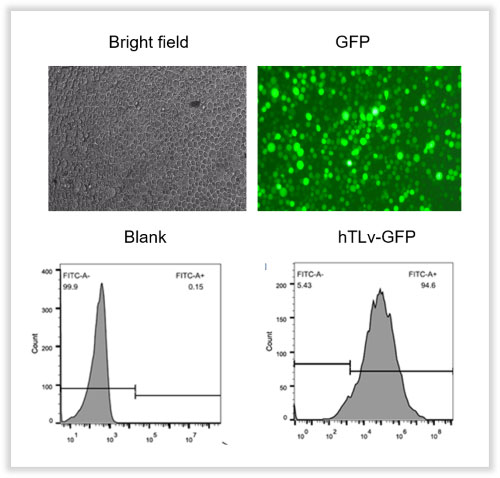
- Lentivirus
- Adeno-Associated
- Adenovirus
- Pseudovirus
- Vector
- Synthesis
- Autophagy Research
- CRISPR/Cas9
- Noncoding RNA
- Luciferase Assay
- Reagents
WHAT ARE YOU LOOKING FOR?
T cells, also known as T lymphocytes, are a type of white blood cell that plays a central role in the adaptive immune response. T cells are produced in the bone marrow and mature in the thymus gland, hence the name "T" cell. Once matured, T cells circulate in the blood and lymphatic system, where they play a critical role in recognizing and responding to pathogens, infected cells, and abnormal or cancerous cells. With the development of cellular immunotherapy, T cell genetic engineering is becoming increasingly significant.
Manipulating the genes of T cells can indeed be challenging due to their specialized functions and characteristics. Several difficulties are commonly encountered when attempting gene manipulation in T cells, including:
Efficient gene delivery: T cells are non-dividing or slow-dividing cells, making it challenging to introduce foreign genes into their genome. Traditional methods of gene delivery, such as DNA plasmid transfection, are often inefficient in T cells due to their low transfection efficiency.
Immune response to viral vectors: Viral vectors are commonly used for gene delivery in T cells due to their high transduction efficiency. However, T cells can mount an immune response against the viral vectors, leading to reduced transduction efficiency and potential safety concerns.
Transgene expression: Ensuring stable and sustained expression of the transgene in T cells can be challenging. Factors such as silencing of the transgene, loss of transgene expression over time, and variability in transgene expression levels among T cells can impact the success of gene manipulation experiments.
Cell Culture: T cells cultured in vitro are very sensitive and fragile, and lentiviral infection has a great impact on the state of the cells. T cells are suspended cells, which further increases the difficulty of effective virus infection.
Hanbio is a biotechnology company that specializes in developing viral vectors for gene delivery and gene therapy applications. The viruses developed by Hanbio for primary T cells include T cell-specific lentivirus and adenovirus (Ads) designed for suspension cells. These viral vectors are specifically engineered to efficiently deliver genes into T cells and facilitate gene manipulation in these immune cells.
T cell-specific lentivirus: Lentiviral vectors are commonly used for gene delivery in various cell types, including primary T cells. Lentiviruses can efficiently transduce non-dividing and slowly dividing cells, making them suitable for modifying T cells, which are typically non-dividing or slow-dividing in nature. Hanbio's T cell-specific lentivirus is optimized for transducing T cells and delivering genes of interest into these immune cells.
Adenovirus (Ads) for suspension cells: Adenoviral vectors are another type of viral vector commonly used for gene delivery in a wide range of cell types, including primary T cells. Adenoviruses have a high transduction efficiency and can efficiently deliver genes into target cells, making them suitable for gene manipulation experiments in suspension cells, such as T cells. Hanbio's adenoviral vectors optimized for suspension cells are designed to effectively transduce T cells and facilitate gene transfer in these immune cells.
Cells derived from the immune system, hematopoietic system, and other sources can be effectively infected with viral vectors, including T cell-specific lentivirus and adenovirus vectors
Viral infection with human or mouse cell specificity;
Can be used to build stable cell lines.
Cell: Human primary CD4+ T cell
Stimulation method: CD3/CD28 antibody and IL-2 activation of 48h
Virus: hTLv-GFP Lentivirus, 1*108TU/mL
Usage:MOI=50


Contact Hanbio and leave your requirements. We will reply as soon as possible.